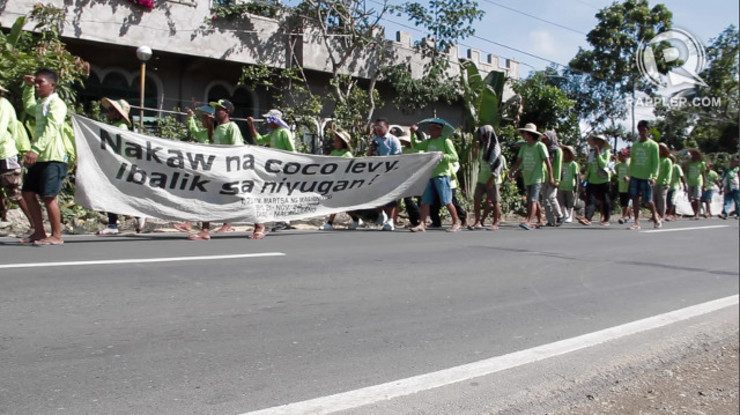SUMMARY
This is AI generated summarization, which may have errors. For context, always refer to the full article.

MANILA, Philippines – Coconut farmers are next in line for the plan of the Department of Agriculture (DA) to help food producers get closer to consumers.
Agriculture Secretary Emmanuel Piñol said the DA is targeting coconut growers as they are among the most neglected.
“Puro copra ang pino-produce (Coconut farmers only produce copra), that’s why we’re introducing new products right now,” he said on Friday, April 26.
“Hindi dapat copra lang eh (It shouldn’t just be copra). We are [also] going to implement…village-level processing facilities the moment na ma-release ang coco levy (that the coco levy fund is released).”
It remains unclear, however, when the multibillion-peso coco levy fund will be released.
Back in February, President Rodrigo Duterte vetoed the Coconut Farmers and Industry Development bill, citing the lack of “vital safeguards.” One of his campaign promises in 2016 was to return the funds to coconut farmers in his first 100 days in office. (READ: ‘Na-Duterte kami’: Why farmers feel betrayed by coco levy vetoes)
Part of the DA’s interventions for the industry is the ongoing project of the Philippine Center for Postharvest Development and Mechanization (PhilMech) to develop a facility for processing coconut water in Pantukan, Compostela Valley.
PhilMech Bioprocess Engineering Division’s Chief Sciences Research Specialist Ofero Capariño told Rappler on Thursday, May 2, that they began working with Cocolife Cooperative to process and distribute coconut water.
“Approximately 2.4 billion liters of coconut water is being wasted per year, assuming that 80% of Philippine coconut production of 13.8 billion coconuts per year is processed into copra or virgin coconut oil,” he added in a text message.
Piñol also pointed that farmers, who are stuck at simply being producers of raw material, depend on traders and middlemen to sell their goods, leading to low farmgate prices but higher retail prices.
“The cause of the problem actually is the lack of financial capacity on the part of the farmers to process this product and the lack of technical support,” he said.
With banks only allotting a fraction of their loan portfolios to the agriculture sector, the DA has been highlighting its own credit facilities implemented by the Agricultural Credit Policy Council.
Prior to the availability of loans, coconut farmers were covered by the Philippine Crop Insurance Corporation in 2013 as another safeguard.
The coconut industry has also been clamoring for support after palm oil dumping was linked to the drop in copra prices in 2018.
However, it was only last March that Malaysia and Indonesia, the top sources of palm oil imports, agreed to cooperate when the DA announced its plan to ban palm oil imports to protect the coconut industry.
Recently, the Philippines also secured another export destination by shipping green coconuts to China. – Rappler.com
Add a comment
How does this make you feel?
There are no comments yet. Add your comment to start the conversation.